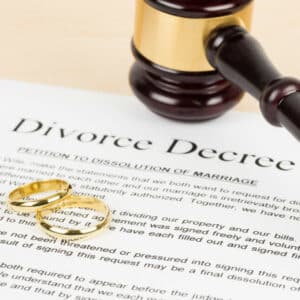Despite having one of the lowest divorce rates in the country, New York is still home to many people ending their marriage. Whatever the reason – from infidelity to financial hardship to general unhappiness – you want to head into divorce with full knowledge of the process and all of your rights. That is where the divorce law team at Brian D. Perskin & Associates enters the picture. We are here to help. Today, that means answering the question, “What is a divorce decree?” and giving you valuable information about what to know before signing a divorce decree.
What is a Divorce Decree?
Although it may seem complicated – most parts of the divorce process do – there is a straightforward and simple answer to the question “what is a divorce decree?” Also known as a final judgment of divorce, a divorce decree is a legal document that sets the terms of your divorce and makes it official. A divorce attorney writes it, the judge signs it, the court clerk files it, and the court issues it to you and your former spouse.
While a divorce decree can cover any number of areas, it has to set clear and mutually agreed-upon guidelines for the following four:
- Alimony
- Child Support
- Child Custody
- Asset Division
It is important to stop here and note that a divorce decree is not the same as a divorce certificate. Your divorce certificate is filed with New York’s Department of Health. And, it contains only information like your name, the name of your former partner, and the date your divorce was granted. A divorce certificate is not a legal document but rather used by New York State to keep records of divorces.

Three Things to Consider Before Signing a Divorce Decree
Due to the emotionally overwhelming nature of divorce, pushing through the process as quickly as possible is often an attractive option. We understand the appeal. However, you should never rush creating, negotiating, or signing a divorce decree. Make sure you know answers to the following questions:
What about the Involvement of Children?
Divorce is much more difficult when children are involved. Issues of child custody and child support need to be considered. More important, perhaps, is the fact that situations change. Children grow up, parents move, financial situations improve, and more. You will want to have addendums added for any and all changes that may affect your children’s lives.
Are You Sure of All Financial Matters?
There is an entire world of financial strategies for divorce. If you own a business with your ex, for example, you will need to take certain steps to protect your equity. If your ex is attempting to hide assets, on the other hand, you will want to make the court aware. This is fraud and illegal. Do you or your ex have debt? That is another consideration. Whatever your unique case, you will want to be sure of both your finances and your ex-partner’s finances.
Hire a Manhattan Collaborative Divorce Attorney
If you settle your divorce outside of court – which is where 90 percent of divorces are settled – you will need both a divorce decree and something called a marital settlement agreement. Your marital settlement agreement can be included in your decree, making the process a bit simpler. Still, you want to check if you need to include a marital settlement agreement before signing a divorce decree.
Divorce is not an easy process, but the talented team at Brian D. Perskin & Associates makes it just a bit easier. We will fight for you every step of the way. And, we will make sure your divorce decree is as favorable as possible. Call us today at (718) 875-7584 for a free consultation.